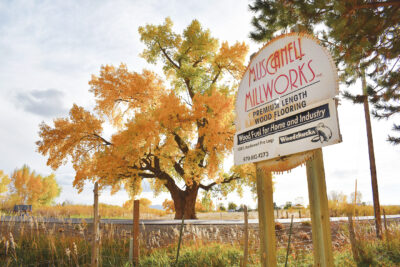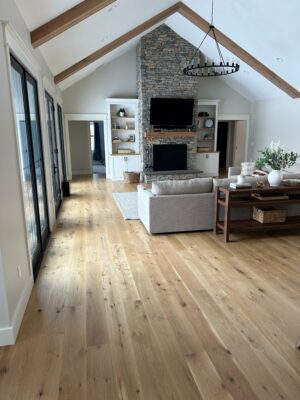Canada—The Canadian International Trade Tribunal (CITT) recently issued a determination that decorative plywood imports from China have not injured and are not threatening to injure Canadian producers of the product.
The Canadian Hardwood Plywood and Veneer Association (CHPVA) said in a statement that it was surprised and disappointed by this decision.
In a parallel investigation the Canada Border Services Agency (CBSA) determined that large volumes of Chinese imports of decorative plywood were being dumped and subsidized at margins of up to 300 percent. The CITT was responsible for determining if the unfairly traded imports had caused injury to the Canadian industry or threatened to do so in the future.
In recent years, several Canadian companies producing decorative plywood have gone out of business in the face of competition from dumped and subsidized Chinese imports. The complaint was filed to address the impact that unfairly traded Chinese imports have had on the Canadian market.
The CHPVA, in its statement, said it finds it difficult to understand how the Tribunal reached the conclusion it did in this case. At presstime, the CITT was due to publish the reasons for the decision and the association and its partners will study these reasons closely and consider their options.
The CHPVA is the national association representing the Canadian hardwood plywood and veneer industry in all technical, regulatory, quality assurance, and product acceptance.
Its members manufacture rotary, sliced, and jointed hardwood veneer, as well as decorative panels used in manufacturing furniture, paneling, cabinetry, doors, shelving, and other similar products.
Its associate members are businesses engaged in production, sales, and distribution of materials and machines for the industry, or that provide services such as brokerage, research, consultation, and transportation to the industry.
For additional information: Patrick Laurin, Executice Vice President plaurin@chpva.ca
Germany—According to published reports, a study has identified the potential of hardwood as a substitute for softwood. The results are available in a brochure from the German Agency for Renewable Raw Materials (FNR). There is considerable potential for hardwood to be used in industrial wood, but it is not yet an option as a substitute for coniferous wood in construction.
Already today, almost twice as much hardwood is provided in Germany as it was 20 years ago. Beech and Oak are the dominant deciduous tree species with a share of 70 percent. There is considerable potential in the use of hardwood. This potential for low-priced wood assortments lies particularly in the manufacture of wood-based materials such as chipboard or fiberboard. High-quality hardwood assortments are suitable for windows and exterior doors, solid parquet, interior fittings, solid wood panels and outdoors.
However, the study also shows that hardwood can only replace softwood to a limited extent. The German timber industry with the key use of building with wood is dependent on softwood. For technical and economic reasons, the available hardwood cannot substitute for coniferous wood in comparable quantities. The large number of types of wood in hardwood with their very different properties make standardization difficult. The processing is usually more technically complex and causes higher costs.
In order to further develop the potential of the use of hardwood in Germany, the authors recommend that companies, among other things, innovate in the development and expansion of manufacturing processes that specialize in hardwood use. In addition, sales-promoting industry communication and marketing for local hardwood are decisive for buyer behavior.
China—According to data from the China Forest Products Industry Association, annual sales of flooring products rose 1.35 percent to 903 million square meters in 2020. Of the total, sales of wood and bamboo flooring was about 412 million square meters; stone-wood-plastic-polymer composite flooring sales were 4.17 square meters; and wood plastic flooring sales were 74 million square meters.
However, sales of wooden and bamboo flooring fell 3 percent to 411.7 square meters in 2020. Sales of laminated wooden flooring were 199 million square meters, a year-on-year decline of 8 percent; wooden composite floors, 138 million square meters, year-on-year up 9 percent; solid wood floors, 41 million square meters, year-on-year down 12 percent; bamboo floors, 28.6 million square meters, year-on-year down 5 percent; and other floors, 5.1 million square meters, year-on-year up 11 percent.
Annual sales of wood and plastic flooring increased about 6 percent to 74 million square meters in 2020. Sixty percent are exported and 95 percent are for outdoor flooring.
Honduras—Honduras and the European Union (EU) have reached an agreement on forest law enforcement, governance and trade in timber products. The agreement will ensure that all Honduran timber and timber products imported in the EU are legally sourced and licensed, according to the European Council.
The Voluntary Partnership Agreement (VPA) was signed this year by the Portuguese Ambassador Nuno Brito, European Commissioner for international partnerships, Jutta Urpilainen, and the Ambassador of Honduras, Roberto Ochoa Madrid. It will enter into force after each Party has ratified it in line with their internal procedures.
Honduras is the first Latin American country to sign a voluntary partnership agreement with the EU under the Action Plan on Forest Law Enforcement, Governance and Trade (FLEGT).
As per the agreement, Honduras will develop robust mechanisms to ensure locally produced timber is legally obtained. A timber legality assurance system will be set up to assess Honduran timber logging with requirements similar to the ones set in the EU Timber Regulation.
This process enhances the EU’s sustainable development and trade goals and will contribute to the broader objective of reducing illegal logging.
Brazil —According to the most recent data released, in January 2021 Brazilian exports of wood-based products (except pulp and paper) increased 22.8 percent in value compared to January 2020, from US$206.6 million to US$253.6 million.
Pine sawnwood exports dropped 6 percent in value between January 2020 (US$37.5 million) and January 2021 (US$35.2 million). In volume, exports fell 8 percent over the same period, from 207,700 cu.m to 191,000 cu.m.
Tropical sawnwood exports increased 7.2 percent in volume, from 29,000 cu.m in January 2020 to 31,100 cu.m in January 2021. In terms of value, exports grew almost 1 percent from US$12.7 million to US$12.8 million, over the same period.
Pine plywood exports saw a surge of 91 percent in value in January 2021 in comparison with January 2020, from US$26.4 million to US$50.3 million. In volume terms exports increased 41 percent over the same period, from 121,000 cu.m to 170,400 cu.m.
As for tropical plywood, exports declined in volume (- 28.3 percent) but the value remained stable. Export earnings US$1.8 million in January 2020 and US$1.8 million in January 2021.
An encouraging increase in wooden furniture exports was recorded in January with the value increased from US$30.0 million in January 2020 to US$41.1 million in January this year, a boost of 37 percent.
Pakistan—Pakistan is experiencing a major economical imbalance caused by the pandemic. The country was suffering from issues even before the pandemic due to depreciation in the Rupee, but now the currency is even more affected. Today, one US-$ equals around 160 Rupees. As Fordaq experts anticipate, in a few months it can be around 200 Rupees.
In order to try to find balance, Pakistan has begun to focus more on local production and the importers tend more towards Eastern European countries, but they might soon become as expensive as their western competitors. The Fordaq experts already noticed that the much higher import prices have started to get handed down to the customers. Also, different log dimensions are imported to gain more flexibility in orders. The Pakistani market prefers to import logs with 30 cm+ diameter. Although it’s still hard to get logs below 30cm, which are available, but the price is too high for low diameters.
Hardwood logs like Ash and other premium species for the production of plywood are imported as well, while plywood imports from Malaysia and China have become rare and the local plywood industry has taken over. Due to the container scarcity there is also lots of money from Pakistani companies stuck in Europe – to pay for containers full of logs that run late or never appear.
The Pakistan Timber Industry Chamber has brought up a case to its government to remove or at least lower import taxes, which are currently at 28 percent.









